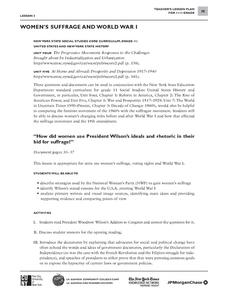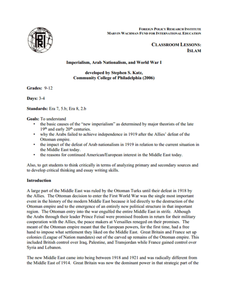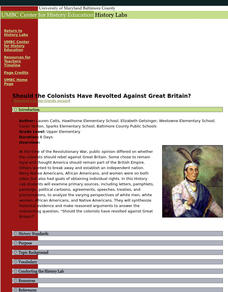Friends of Fort McHenry
Citizens For and Against the War of 1812
Use this exceptional resource to examine the discourse and debate that occurred at the start of the War of 1812 with your class. Learners will first consider their own position on the war in a silent journal writing activity. Then after...
Curated OER
Ending the War, 1783
Learners investigate how successful they were in obtaining their goals in the Revolutionary War. The peace feelers of 1775 are examined and the reasons for the British rejection of them explored. the main provisions of the Treaty of...
Theodore Roosevelt Association
Defining America's Role in the World
As the first American president to win the Nobel Peace Prize, and only one of four presidents to do so in United States history, Theodore Roosevelt's foreign policy achievements and preservation of peace are often overshadowed by his...
Curated OER
Independent - To Be Or Not To Be
Students examine national symbols of freedom and speech strategies. They study the constitution, forefathers, and the Declaration of Independence.
Curated OER
Debate: Should the U.S. Annex the Philippines?
Building an argument with supporting evidence is a vital skill. Learners engage in a debate over the annexation of the Philippines after the Spanish-American War. They take on the perspective of an individual from that time period,...
Curated OER
The Monroe Doctrine: President Monroe and the Independence Movement in South America
Pupils identify conditions in Europe that relate to the independence movements in South America and list reasons why President Monroe gave for recognizing the independence movement in South America.
Smithsonian Institution
Lexington and Concord: Historical Interpretation
Learners view and analyze three different images related to the Battle of Lexington and Concord. They also answer a variety of questions in a graphic organizer to help keep the information straight.
Curated OER
Basil Heatter, "The Long Night of the Little Boats"
“It was a miracle.” Basil Heatter’s “The Long Night of the Little Boats,” which details the miraculous rescue of the British army from the shores of Dunkirk in 1940, is featured in a series of exercises that ask class members to read,...
National Park Service
Making Choices
What factors go into a decision to enter a war? Use a collection of primary source documents and images to prompt a discussion about the American Revolution and the reasons for entering a war against Britain.
City University of New York
Woman's Suffrage and World War I
How did women use President Wilson's ideals and rhetoric in their bid for suffrage? To answer this essential question, class groups analyze primary written documents and visual images.
Foreign Policy Research Institute
Imperialism, Arab Nationalism and World War I
Continued conflict in the Middle East makes this lesson relevant, and the inclusion of a critique of Lawrence of Arabia might increase student interest in a potentially challenging topic. The resource includes a solid...
Curated OER
Road to Revolution
Students discuss reasons war erupted between Britain and the colonies. They examine and explain critical events of the 1760s, and discuss what rights and beliefs Americans felt were being violated.
City University of New York
The Split Over Suffrage
Compare and contrast Frederick Douglass's and the National Women's Suffrage Association's stances on equal rights and suffrage with a series of documents and worksheets. Learners work together or independently to complete the packet, and...
Curated OER
The End of United States' Occupation of Japan
Ninth graders examine and discuss reasons for end of U.S. occupation of Japan in 1952, locate surrounding Asian countries on map, explore changes to Japan after World War II, and discuss how changes in Japan impacted other countries.
Curated OER
Trade Wars: the Candidates Take a Stand
Students research topics related to trade, and develop a graphic organizer. They debate and discuss topics related to trade.
Curated OER
We The People: A History
Students play a game about taxation where they have tax collectors that simulate the feelings and reasons that led to the American Revolution. In this taxation lesson plan, students learn about why the people in the colonies were so...
Curated OER
Colonial Flag
Students examine the reasons for and the results of the US Revolutionary War. They watch a PowerPoint presentation to review the immediate results of the war. They design a flag for the newly free colonies.
Center for History Education
Should the Colonists Have Revolted Against Great Britain?
Should the Americans have taken the plunge and revolted against Great Britain? Using documents, including the famed Common Sense and a Loyalist response, pupils conduct a lengthy investigation of the question. The interesting resource...
Museum of Tolerance
The Pursuit of Democracy and Diversity: The Trial of Pro-Social Injustice in Historical Documents and Accounts
Class members investigate The Indian Removal Act of 1830, U.S. Theft of Mexican Territory Timeline, and President Abraham Lincoln’s letter to Horace Greeley, 1862, and then conduct a mock trial of each of these documents to determine...
Curated OER
Understanding American Values
Scholars read books and discuss emotions that lead up to the American Revolution. They also discuss vocabulary and use reference materials to research the Internet for causes and sentiment that led to the American Revolution.
Curated OER
4 Corners Pre-reading Strategy for A Raisin in the Sun by Lorraine Hansberry
High schoolers consider different statements based on the themes from Lorraine Hansberry's A Raisin in the Sun, and decide what they think of the statement. They share their ideas as a class and discuss all sides to a idea.




















